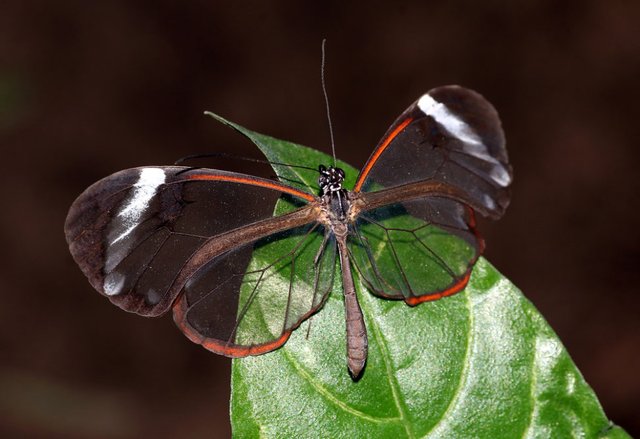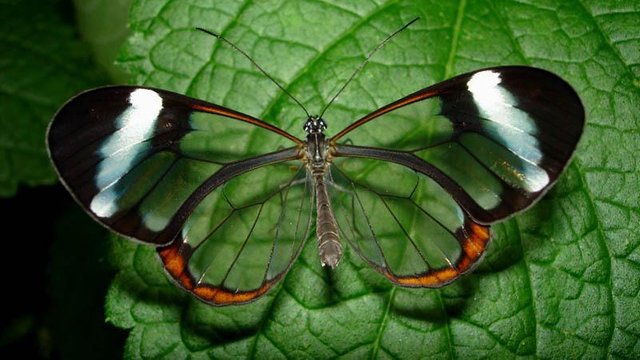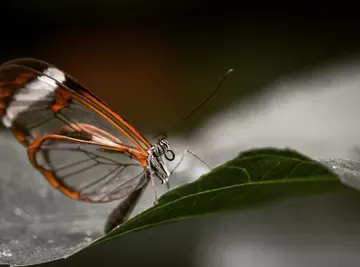Hello STEEMIT, how are you doing today.
Alright i want to show you something interesting today,trust me your going to be greatly impacted .
THE GLASSWING BUTTERFLY(THE GREAT OTO)
Greta oto is a species of brush-footed butterfly and member of the subfamily Danainae, tribe Ithomiini, and subtribe Godyridina. It is known by the common name glasswing butterfly for its transparent wings, which allow it to camouflage without extensive coloration. In Spanish speaking regions, it may also be referred to as espejitos, meaning "little mirrors" because of its transparent wings.[1] The butterfly is mainly found in Central and northern regions of South America with sightings as far north as Texas and as far south as Chile. While its wings appear delicate, the butterfly is able to carry up to 40 times its own weight.[2] In addition to its wing physiology, the butterfly is known for behaviors such as long migrations and lekking.[1] The Greta oto closely resembles the Greta andromica.

https://www.flickr.com/photos/gerbosma/39790558643
Glasswinged butterfly
Greta oto.
Scientific classification
Kingdom:
Animalia
Phylum:
Arthropoda
Class:
Insecta
Order:
Lepidoptera
Family:
Nymphalidae
Genus:
Greta
Species:
G. oto
Life cycle
Egg
A nightshade plant
Eggs are typically laid on plants of the genus Cestrum, a member of the nightshade family of plants, which serves as a food source for later life stages.[1]
Larva
The caterpillars of the glasswing butterfly have green bodies with bright purple and red stripes. They are found on the host plants of genus Cestrum.[4] The larvae are cylindrical in shape with dorsal projections that are smooth with filaments. These properties make the larvae extremely reflective, which essentially causes them to be invisible to predators.[5]
Pupa
The pupae are silver in colour.[1] During the fifth instar stage, the pupa produces a silk pad on the lower surface of leaves through four spinning movements, onto which it attaches. The silk fibers are important in providing greater flexibility to the pupa attachment. The cremaster, a hooked bristle-like structure on the pupa, attaches to this silk pad by a series of lateral movements of the pupa’s posterior abdomen. Pupa attachment failure occurs when the silk pad breaks. Additionally, researchers have found the pupa attachment to have high tensile strength and toughness, which prevent the pupa from being pulled by predators or breaking off in the wind, allowing them to swing safely.[6]
Greta oto adult
Lantana flower nectar is a food source for adult glasswing butterflies
Adult
The adult glasswing butterfly can be identified by its transparent wings with opaque, dark brown borders tinted with red or orange. Their bodies are a dark brown color. The butterflies are 2.8 to 3.0 centimetres (1.1 to 1.2 in) long and have a wingspan of 5.6 to 6.1 centimetres (2.2 to 2.4 in)

FACTS ABOUT THE GLASSWING BUTTERFLY

Most insects don’t bring to mind words synonymous with beautiful, but there is one exception to this rule – butterflies. These delicate creatures come in many shapes, forms and sizes; they occupy most regions of the earth, specifically warm and tropical regions. The types of butterflies are so diverse that one type – the glasswing butterfly – has clear, transparent wings.
Clear Wings
The most obvious fact relating to the glasswing butterfly is that it contains transparent wings, usually with an outline of black or orange -- although the colors can vary. This unique characteristic occurs because the butterfly has no colored scales, which account for the color variations on most butterfly species. It has a wingspan of around 2 inches.
Strength
Most people know that many insects – such as ants – can lift many times their own body weight. If you ask most people about butterflies and strength, they’d probably never guess that, pound for pound, butterflies have ants beat by a mile. The glasswing is one especially strong species of butterfly. Although it might look weak, it has the ability to carry nearly 40 times its own weight. It is also very fast, with the ability to fly up to eight miles per hour for short periods of time.
Range and Type
The glasswing butterfly isn’t common all over the world. It is most well-known around Central America, extending up into portions of lower North America. The butterfly hails from the Lepidoptera order and Nymphalidae family.
The glasswing butterfly is a very rare specie of butterfly.
It was nice sharing this post,hope you loved it.
@cryptokannon @stephenjendal @bright-ibias @ngoenyi @xpillar
@whitestallion
If photos are not your own, you must put the source or otherwise, this act will be considered as plagiarism. Repeating plagiarism will be muted from the community. Here I share the link where the photos were taken!
https://www.flickr.com/photos/gerbosma/39790558643
cc : @blacks
Downvoting a post can decrease pending rewards and make it less visible. Common reasons:
Submit